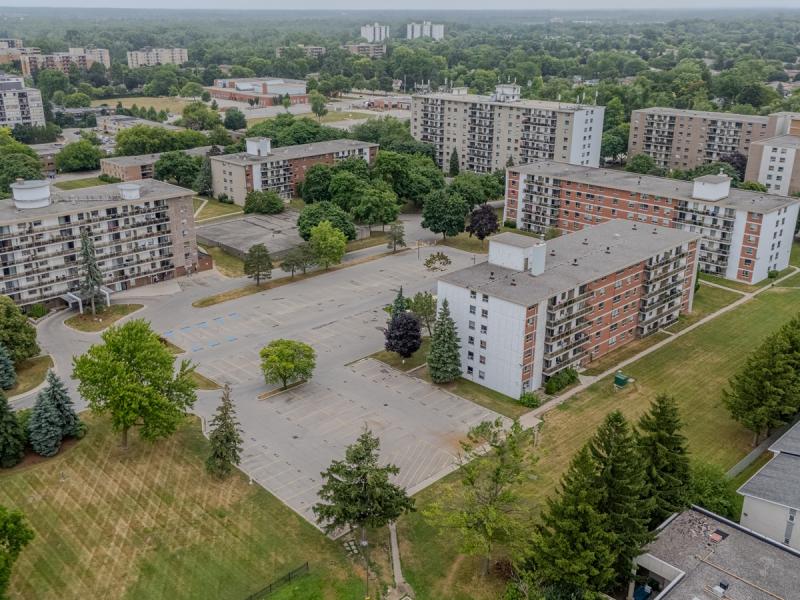
Canada is essentially in recession and, combined with several other factors, that will “defeat” inflation and allow the Bank of Canada to begin cutting interest rates next summer, according to CIBC Capital Markets managing director and deputy chief economist Benjamin Tal.
Delivering his annual opening address to 2,700 attendees at the Real Estate Forum in Toronto, Tal explored the impact this will have on 10-year lending rates, which he called a major factor for executives looking for future cap rate guidance.
His bottom line? The Bank of Canada’s (BoC) overnight rate will ultimately settle into the 2.75 to three per cent range, with 10-year rates in the 3.25 per cent range.
To arrive at that conclusion, he turned the normal good news/bad news scenario upside down.
“We are in a tricky situation in which bad news is good news,” he said, “and if bad news is good news, then I have plenty of good news for you this morning.”
Dramatic drop in inflation rate
Tal noted the dramatic rise in interest rates during 2022 and early 2023 has already brought inflation down significantly, but not yet to the bank’s two per cent target.
“This is not about inflation, inflation will go to two per cent," he said. "This is about the cost of bringing inflation down to two per cent . . ."
And while this has happened rapidly, Tal reiterated a message he’s delivered before: “A recession versus inflation, (the BoC) will take a recession any day. We have to realize that. They don’t feel a recession, they feel inflation. . . .
“Which means we are stuck with an inflation figure of two per cent. I don’t think two per cent is the right number, but that doesn’t make any difference.”
He also called the “last mile” in taming inflation the most difficult to achieve.
“We are down in terms of inflation dramatically from six or seven per cent to three per cent. We have to move from three, 3.5 to two. That is tough.”
A "GDP per capita recession"
There is currently a “tug of war” between inflation and a slowing economy, and he said in many respects the Canadian economy is already in recession.
The factor preventing it from formally becoming a recession, Tal said, is rapid population growth.
“You want good news? I’ll give you good news. We are in a recession. We are in a per capita recession,” he explained. “GDP per capita is down by two per cent, consumption per capita is down by three per cent. We are in a GDP per capita recession, no question about it, and the question is why we haven’t seen a recession otherwise.
“The reason is the one million newcomers we got into this country over the past year. The only reason the recession isn’t official is the one million people that we got.”
While the influx of newcomers will continue, Tal said several other factors contributing to higher inflation have disappeared.
Supply chain issues have abated and Canadians have spent the additional $165 billion they had saved during the COVID-19 pandemic lockdowns.
“When the Bank of Canada was raising interest rates, we were spending our excess savings . . . basically sabotaging monetary policy,” he explained. “So the Bank of Canada was impotent to deal with the situation because we were spending our savings.”
Not anymore: “Now we feel the pain immediately.”
Business confidence "basically negative"
Among the other factors Tal cited is business confidence, which has ebbed steadily over the past year. As spending has slowed, so have new business openings, new hiring and wage growth.
“Business confidence is basically negative. This is a level that is consistent with a recession,” he stated. “So business confidence is down; we haven’t seen it in a long time.
“All those factors suggest that we are very close to a recession or a very mild landing, whatever it is. It’s not strong.”
Which leads him to believe the BoC’s fiscal strategy is working, maybe too well.
“To me, interest rates are working and the Bank of Canada is actually overshooting.”
Serious impact on housing market
One sector feeling the pain is housing, with higher mortgage rates hitting both owners – including investors – and potential buyers.
This cascades into the apartment market, where rents are increasing dramatically as people who would normally buy a home instead opt to, or are forced to, delay a purchase.
“The mortgage market is a shadow of its former self. We have never seen the mortgage market falling so quickly. Even in the ’91 recession, the mortgage market did not fall so quickly,” he said. “The real estate market is facing, and I’m not saying this lightly, the residential real estate market is facing not only recessionary territory but also the biggest test since the ’91 recession.”
Sales, he said, are in “free fall,” down 41 per cent year-over-year and 15 per cent below 2011, the last major market upheaval.
However, it will not assist affordability in the long term, he contends, and is difficult for many investors and owners to navigate today.
“The correction in the housing market is real. It is healthy, it is good, but it is not easy if you are in the market.”
He does not expect it to last long, though, if interest rates come down.
“A year to two years from now when things will be back to normal – and they will be back to normal, with one million newcomers and non-permanent residents – guess what will happen? The supply will not be there, the demand will be there. The market will be crazy.
“Now, we are taking a break, a very healthy break.”
"Inflation will be defeated"
He also reiterated a point he’s made in previous economic updates – the BoC is contributing to inflation with higher interest rates because housing costs comprise about 30 per cent of the Consumer Price Index, a situation he calls “totally crazy.”
However, all this leads him to conclude interest rates will come down. Soon.
“This means that inflation will be defeated. A year from now, inflation will be closer to two per cent, with major implications for the Bank of Canada.”
His parting message was one of hope, noting Canada’s commercial real estate industry has historically performed well when rates have moderated into the territory he forecasts.
“This market is healthy, this market is just facing recessionary forces. The fundamentals of the market are relatively healthy and will continue to be healthy,” he stressed.
“Let me remind you that you guys can do extremely well at the three per cent overnight rate, 3.25 per cent 10-year rate. You can do extremely well, you’ve done it in the past . . . we just have to get used to the environment.”










